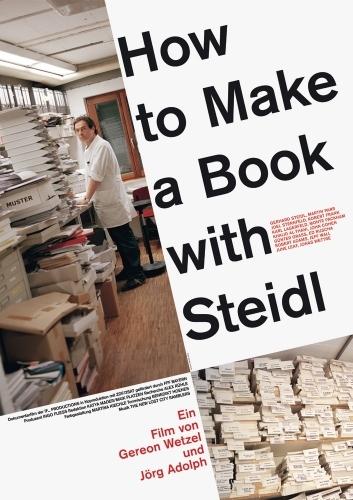How to make a book with Steidl

When we ran into Alex Rühle, he was loading his weekend groceries into his bikes child trailer. He looked tired, more than usual. All the same, he immediately began telling us about the crazy time hed had researching a piece on legendary photographer Robert Frank for his At Work column in the Süddeustche Zeitung. Hed spent the last three days travelling all over the place with Franks publisher Gerhard Steidl to Göttingen, Paris and Nova Scotia! Hed then slept on the train for the entire return journey from the airport. And it was only because the conductor had woken him in Munich that he hadnt ended up in the train depot. Now he quickly had to write a good article, a full page in the arts and culture section. The piece had to do justice to his great encounter with Frank and Steidl. Perhaps it wouldnt even be an article about Robert Frank, but rather about the work of his amazing publisher?
After the article was published, Alex was nervous: what would Steidl think of the portrait? For a while, nothing happened. Alex feared the worse. But finally a call came.
Gerdsteidlforaxrühle,
Oh, hello, Mr. Steidl, how are you?
Fine. If you ever want to make a book out of At Work, you can come by any time.
But instead of immediately planning his book, Alex Rühle first considered making a documentary film with Steidl: he thought that all the frenetic running about, the back and forth between Göttingen and the rest of the world, all the books and people, images and conversations, could be captured even more impressively in a documentary. So Axrühle called Gersteidl and announced the arrival of two documentary filmmakers, who would soon appear at Düstere Strasse 4 in Göttingen and wait for Steidl.
When we arrived, Claudia Glenewinkel, a publicist and editor at Steidl, explained that she would be our guide for the day, as Steidl himself had to finish a catalogue for Karl Lagerfeld. Walking up and down the stairs, we met each of the 45 employees, or rather, we were introduced to them with the words, These are the two guys that want to make a documentary. The timid objection that wed only come to explore ideas and begin an initial dialogue became useless when Steidl himself appeared from the depths of the labyrinth. Hello. No time. Documentary film. Great. Rühle said youre the right people for the job. Rühles word is worth its weight in gold. I usually cant bear having anyone with me when I travel and especially no journalists but with Rühle things went really well. Nice guy. More later.
So once again, we found ourselves reading and waiting in the library at Steidlville. Hours later, and just before the last train to Munich, the internal line finally rang for us: Now I have a few minutes. We ran downstairs and entered Steidls paper cave. He ate his lunch much too late and while standing and told us what he thought about the film project. The work here at the publishing house is particularly important. You can take a look at everything here. You can accompany me for a few weeks, well go to London, Paris, New York… Thats important too, then you can see how I work, ten appointments a day, one after another. You can stay here and see what you want to film, shoot until you have what you need. Thats your job, something I know nothing about.
And so we did just that if only filmmaking were always so easy! With a small but vital budget from 3sat and the support of FilmFernsehFonds Bayern, we were able to accompany Gerhard Steidl for a year and observe him making books that are as beautiful as they are important. We lugged Steidls overfilled suitcases from airport to airport and to photographers studios, to then quietly film and listen in on their conversations. And together with Joel Sternfeld we waited for Steidl to continue work on Sternfelds iDubai.
As documentary filmmakers, these photographers taught us a great deal about craftsmanship, subject matter and concept. In photography, there is a passionate debate about the art of the real, as well as an audience that has its eyes open that is attentive enough to look past the surface. In the varied world of photography, its easy to find perspectives that are clearer, more honest, and more passionate that many found in contemporary documentary film which has to provide both information and entertainment (How to Make a Book with Steidl being the exception). But we also learned that books have to smell good, and that a great deal can be achieved in a niche like this one if you proceed as radically, systematically, and lovingly as Gerhard Steidl does. Its just too bad that the time we spent filming with Steidl flew by so quickly we would have loved to shoot more material on at least two dozen artists and book projects.
Out of stock
Out of stock


